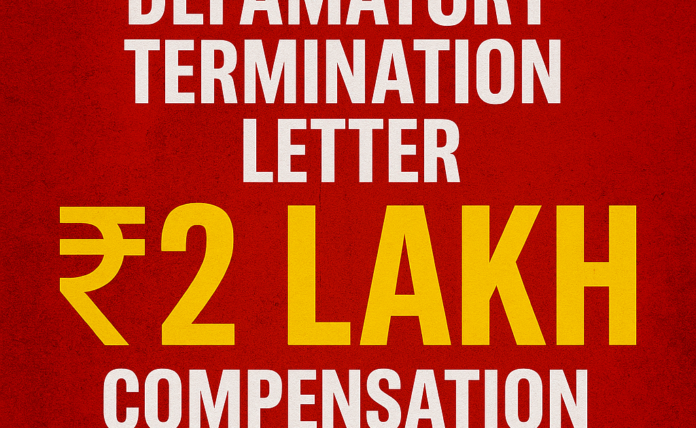[ad_1]
🚨 Corporate India Beware: Termination Letters Are Not Personal Attack Tools!
In a landmark judgment that should shake every HR and legal department across India, the Delhi High Court, in CS (OS) 31/2021 – Abhijit Mishra vs Wipro Ltd., ruled that Wipro’s termination letter was defamatory, unsubstantiated, and damaging to the employee’s professional dignity. The court awarded ₹2 lakh compensation to the former employee and ordered Wipro to issue a fresh termination letter minus the defamatory remarks.
📌Case Background: When Termination Becomes Character Assassination
Wipro, one of India’s top IT companies, terminated Abhijit Mishra, a Principal Consultant, with a letter laced with aggressive language. The letter described Mishra’s conduct as:
- “Malicious”
- “Irreparable breakdown of trust”
- “Damaging to company’s environment”
No inquiry. No evidence. Just labels.
Delhi High Court called it what it truly was — character assassination in corporate disguise.
⚖️ Legal Bombshell: CS (OS) 31/2021 – Judgment Highlights
🧑⚖️ Justice Purushaindra Kumar Kaurav didn’t mince words. The Court ruled:
“The allegations in the termination letter were baseless, defamatory, and caused direct harm to the plaintiff’s reputation and future career prospects.”
💥 Key Legal Highlights:
-
Defamatory Allegations Without Inquiry = Illegal
-
No Documented Proof, No Domestic Enquiry = Violation of Natural Justice
-
Forced to Share Letter With Future Employers =
👉 Doctrine of Compelled Self-Publication Applied -
Employer Cannot Escape Liability by Marking it ‘Confidential’
-
₹2 Lakh Compensation Granted + Mandatory Clean Letter
💡 What Is the Doctrine of Compelled Self-Publication?
This legal doctrine means:
If an employee is forced to show a defamatory document (like a termination letter) to potential employers, the employer is liable for the consequences of that defamation—even if the document was “confidential.”
Wipro tried to hide behind the “internal use only” clause — the Court destroyed that excuse.
🧠 HR & Corporate Takeaways – Write Letters, Not Libels
🚫 Termination letters are not vendetta diaries.
✅ HRs must ensure that exit communication is legally vetted, neutral, and backed by documented evidence.
| ❌ Don’ts | ✅ Do’s |
|---|---|
| Use emotionally charged words | Stick to facts and policy breaches |
| Accuse without inquiry | Conduct a domestic inquiry with proper notice |
| Assume “confidential” means safe | Understand “self-publication” liability |
| Defame ex-employee | Maintain neutral, respectful tone |
🔥 Compliance Monk’s Verdict:
⚠️ If you’re a CHRO, HRBP, Legal Counsel, or Compliance Officer — let this be your wake-up call.
Defamation via HR documents is a ticking time bomb.
Just because you’re an employer doesn’t give you the right to assassinate someone’s professional reputation in writing — especially without due process.
Today it’s ₹2 lakh. Tomorrow it could be ₹2 crore.
📢 Final Word:
🧨 Abhijit Mishra vs Wipro is not just a case.
It’s a compliance warning to every corporate house in India.
✅ If you terminate, do it lawfully.
✅ If you write, do it responsibly.
❌ Or be ready to PAY for your PEN!
📲 Stay Updated with Compliance Monk
For regular updates on labour law, employment litigation, HR compliance, and Supreme Court & High Court judgments:
👉 Follow us on YouTube: Compliance Monk
👉 Read more blogposts: boardhr.blogspot.com
🏷️#WiproTerminationCase #CSOS312021 #AbhijitMishraVsWipro #DefamationLaw #HRCompliance #CorporateLawIndia #LabourLaw #DelhiHighCourtJudgment #CompelledSelfPublication #ComplianceMonk #TerminationLetterMistake #LegalNewsIndia #EmploymentLawIndia #ReputationDamage #EmployeeRightsIndia
Delhi High Court slaps Wipro with ₹2 lakh fine for defaming an ex-employee in a termination letter. Learn how ‘compelled self-publication’ made a confidential HR document legally punishable. A must-read for HRs, legal teams, and compliance heads. #WiproTermination #LabourLaw
[ad_2]
Source link


